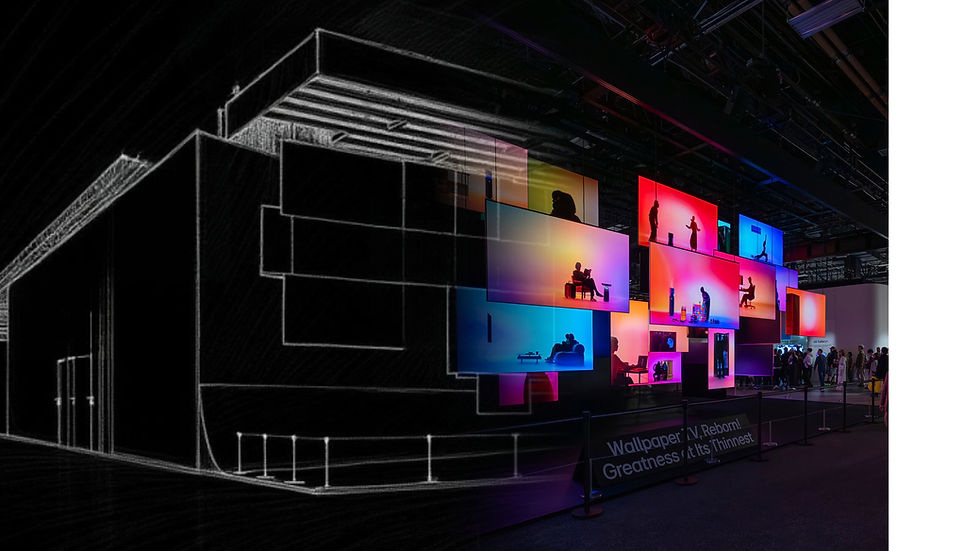Connection to Conversion: The New Playbook for Experiential Events
- Czarnowski

- May 27, 2025
- 3 min read
Updated: Jun 20, 2025
Engagement isn’t a metric—it’s a mindset.
Whether it’s a demo, a drink, or a VR headset—experiences attract people. And people drive conversions.
In today’s hyper-digital world, the value of in-person connection has never been greater. When it comes to events—whether trade shows, conferences, or brand activations—the real magic doesn’t happen at the keynote. It happens in the moments when attendees get to touch, feel, taste, and experience your brand in action.
This is where experiential learning shines. More than just a buzzword, it’s a strategic approach that transforms passive spectators into active participants—and ultimately, loyal customers.

Why Connection Beats Attention Every Time
Let’s be honest: attention is fleeting. You might have the flashiest booth or the biggest banner, but if you’re not engaging attendees on a deeper level, you're missing out on a massive opportunity.
Experiential learning is all about creating two-way interactions. It's giving your audience something to do, not just something to look at. When people get involved—when they can experience your product or service firsthand—they’re more likely to remember it, trust it, and buy into it.
And that’s the endgame: not just connection for connection’s sake, but conversion.
4 Ways to Convert Your Connections
So, how do you turn connection into conversion? Here are a few proven strategies:
1. Hands-On Product Demos
Let attendees get their hands on what you’re offering. Whether it’s a tech tool, beauty product, or piece of machinery, tactile engagement builds confidence and removes doubt.
Benefits:
Builds trust through transparency
Shows product benefits in real time
Opens the door for on-the-spot feedback and questions
Pro Tip: Pair demos with a QR code for instant access to a special offer or signup form—streamlining that path to conversion.
2. Interactive Activations
Want to be remembered? Create an experience. Simulators, VR stations, gamified challenges, or even a branded photo op can leave a lasting impression.
Why it works:
Activates multiple senses, leading to a higher recall
Encourages social sharing, thus expanding reach
Creates positive brand associations = emotional connection
Example: A flight simulator at an aviation expo doesn’t just entertain—it immerses the user in your value proposition.

3. Feed Them, They Will Come
There’s a reason people gather around food. Offering quality refreshments isn’t just generous—it’s strategic. It creates dwell time, conversation starters, and a relaxed environment to learn more about what you offer.
Make it work for you:
Brand your food and drink stations with messaging
Offer custom cocktail/mocktail names tied to your theme
Use the moment to introduce your team in a natural way

4. The People Make the Pitch
No activation or booth setup can beat a passionate, informed sales team. These are your frontline storytellers. Equip them not just to pitch, but to connect.
Keys to success:
Train them to listen first, pitch second
Encourage storytelling instead of sales scripts
Make sure they’re fully up to speed on new products or launches
When attendees leave thinking, “That person really understood what I needed,” you've done your job right.

Measuring Success: What Does Conversion Look Like?
Conversion isn’t always a sale on the spot. It might be:
A lead scanned
A meeting booked
A follow-up conversation scheduled
A social media tag
A newsletter signup
Track these touchpoints. They’re signals that your experiential approach is working—and they’re the start of a longer relationship.

Real-World Recap: Putting It All Together
Let’s say you’re launching a new fitness product at an industry event themed “The Future of Fitness”. Connecting with your attendees on a deeper level may look like:
Setting up a mini workout station where attendees can test it out.
Hosting short, high-energy demo sessions every hour.
Offering a branded smoothie bar right next to your activation.
Encouraging visitors to snap a photo in front of a custom “Future of Fitness” backdrop.
Ensuring your team is nearby—not hovering, but ready—with tablets to answer questions and offer promo codes.
Attendees don’t just walk away with a brochure. They leave with a story, a taste, a feeling—and hopefully, a strong reason to reconnect.
Final Thoughts: Make it Memorable, Make it Matter
The best events don’t just showcase—they involve.
When you create an experience that invites attendees to participate, learn, and emotionally connect, you don’t just win attention—you win trust. In an age where trust drives buying decisions, that’s the real ROI. So next time you plan an event, ask yourself: “Are we just informing… or are we involving?”
Looking for ways to level up your event engagement strategy? We’ve got ideas.


